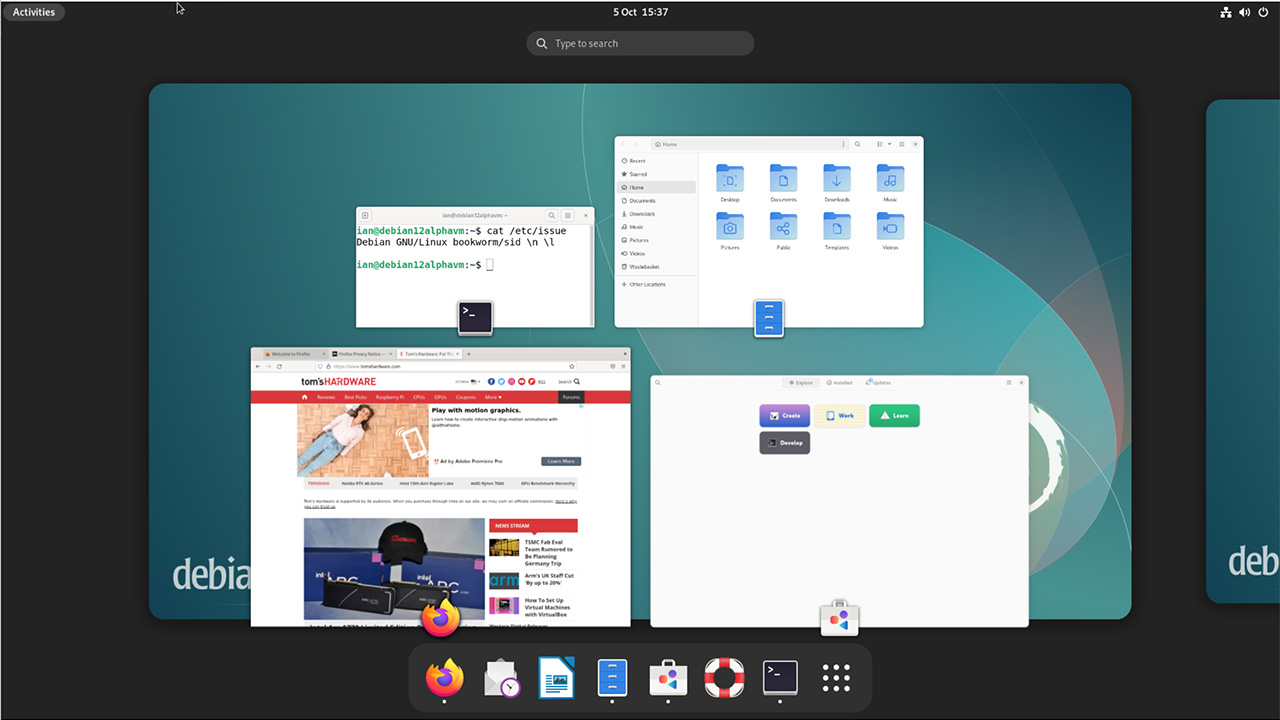Debian Votes To Add Non-Free Firmware to Official Install Media
Worth it to get working Wi-Fi, perhaps
Get Tom's Hardware's best news and in-depth reviews, straight to your inbox.
You are now subscribed
Your newsletter sign-up was successful
Update 06:18 PT 10/6/2022:
The initial version of this story incorrectly described that Debian were including non-free software. The article has been updated to correct the information.
Updated Article
Debian, a popular upstream Linux distribution and the base on which Ubuntu is made, has voted to allow non-free firmware packages in its official install and live media. In the past, non-free firmware was available via a section of the Debian archive. The non-free firmware typically contains firmware which doesn't meet the Debian Free Software Guidelines (DFSG). For example some Wi-Fi adapters require non-free firmware in order to work.

On Debian's General Resolution: non-free firmware page, officers, leaders and members of the many Debian teams voted on a series of proposals for including non-free firmware on official Debian install media.
- Choice 1: Only one installer, including non-free firmware
- Choice 2: Recommend installer containing non-free firmware
- Choice 3: Allow presenting non-free installers alongside the free one
- Choice 4: Installer with non-free software is not part of Debian
- Choice 5: Change SC for non-free firmware in installer, one installer
- Choice 6: Change SC for non-free firmware in installer, keep both installers
Of the six choices presented, choice 5 was selected as the winner. The proposal, presented by Russ Allbery, sees a change to the Debian Social Contract, specifically a change to point 5 which originally read.
"Works that do not meet our free software standards"
Get Tom's Hardware's best news and in-depth reviews, straight to your inbox.
"We acknowledge that some of our users require the use of works that do not conform to the Debian Free Software Guidelines. We have created contrib and non-free areas in our archive for these works. The packages in these areas are not part of the Debian system, although they have been configured for use with Debian. We encourage CD manufacturers to read the licenses of the packages in these areas and determine if they can distribute the packages on their CDs. Thus, although non-free works are not a part of Debian, we support their use and provide infrastructure for non-free packages (such as our bug tracking system and mailing lists)."
The change to the social contract sees the following line appended to point 5
"The Debian official media may include firmware that is otherwise not part of the Debian system to enable use of Debian with hardware that requires such firmware."
In Allbery's proposal, they state "We will include non-free firmware packages from the "non-free-firmware" section of the Debian archive on our official media (installer images and live images). The included firmware binaries will normally be enabled by default where the system determines that they are required, but where possible we will include ways for users to disable this at boot (boot menu option, kernel command line etc.)."
So what does this mean to the end user? Users installing Debian to their machines will now see that more hardware is supported "out of the box" during the install process, as the non-free firmware will be enabled by default, should the system determine that they are required. But should you deem them unnecessary, there will be a means to disable the use of non-free firmware during the boot process.

Ian Evenden is a UK-based news writer for Tom’s Hardware US. He’ll write about anything, but stories about Raspberry Pi and DIY robots seem to find their way to him.
-
atomicWAR To get wifi (and others) working a deal with the Devil is made...but it is still a deal with the Devil! Sad times...Reply -
RichardtST As complexity goes up, compatibility goes down. That said however, I don't see a problem with including propriety drivers. In general, hardware vendors supply drivers for free anyway. If you've already paid for the hardware, why shouldn't you use the driver that comes with it? I see the issue here not as the use of a proprietary driver, but that the driver has to exist at all. Why isn't the hardware built to be compatible with existing drivers in the first place? That is the problem.Reply -
That's a good thing. The issues with drivers were a nightmare in Linux. The performance was worse than Win10, less options to choose from, no documentation, etc. Whenever I installed a Linux distro I wanted the OS to work. I didn't want to spend hours of searching the internet, asking at forums, to make the WiFi or ethernet work.Reply
The problem is not the proprietary drivers, the problem is no driver at all. -
odgalvin This article and its title are misleading. The change is that nonfree firmware, which isn't part of the Debian system, is now being included in the installation media to enable certain drivers to work - the drivers themselves aren't effected. All drivers (like any other software) included in Debian is free/open, same as always.Reply -
palladin9479 Debian's "no non-FOSS software" stance has caused it way more pain then needed and why I stayed firmly within the CentOS/ RHEL space for my home linux needs. Alowing firmware / non-FOSS drivers is over a decade too late but at least it happened. Not all devices store firmware on the device PROM chips and instead rely on the drivers to load the firmware into system memory, that is where the huge disconnect is at.Reply